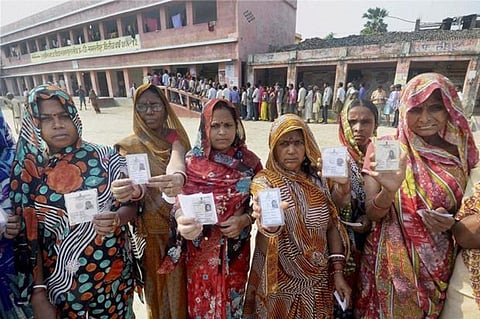
- Home
- न्यूजग्राम
- India
- World
- Politics
- Entertainment
- Culture
- Lifestyle
- Economy
- Sports
- Sp. Coverage
- Misc.
- NewsGram Exclusive
- Jobs / Internships

By Sreyashi Mazumdar
Politics in Bihar is nothing less than a concoction of casteism and social issues which are effectively used by the political parties to hold their grounds. Caste based politics has been a persistent bait, manoeuvring the fate of Bihar politics for a considerable time now; be it Lalu Prasad Yadav riding the yadav community, Kurmis, Koeris, Muslims plumping for Nitish Kumar or BJP banking for upper castes like Bhumiyars, Kayasthas and Bramhims for their share in the game.
However, taking to a different genre altogether, the 46.6 per cent of the women folk constituting the vote bank in Bihar has turned out to be a game changer on several instances. For instance, in the 2005 Bihar assembly election, women played a significant role behind Nitish Kumar's triumph; toeing on a similar line, the 2010 assembly election ended on a similar note, thanks to Nitish Kumar's women centric schemes. Immediately after coming to episode- a whopping percentage of 54.4 per cent of women voters had cast their votes during the elections.
Ever since Nitish Kumar has been helming the affairs, there has been a considerable change in the electoral politics of Bihar. Though women in Bihar have always been politically conscious, their decisiveness seemed stronger during the 2005 assembly elections in the month of October and henceforth.
According to a report in thewire.in, the voting percentage of men came down by three per cent and in case of women it went up by two per cent in the year 2005. Further in 2010, 54.4 per cent of the women voters casted their votes as compared to 51.5 per cent of the male voters, thereby bringing forth a change in the political construct.
One of the major reasons corroborating the surging change in power was that he dished out a string of measures that would ensure women's prosperity. In the year 2005, Kumar announced a 50 per cent reservation for women at the Panchayat level; further, in 2008 he distributed free land to women belonging to the Mahadalit and Muslim communities.
Besides that, he also rolled out a special scheme for girls appearing for the matriculation exams wherein a girl who bags a first division gets awarded with a hefty amount of Rs. 10,000 and the one with a second division receives Rs. 8,000. The chief minister delved into matters concerning hygiene. In the year 2014, he launched a program wherein school going girls from 8th to 12th standard will be given Rs 150 per annum for sanitary napkins.
Wading through the rugged terrain of a village located in rural Bihar, Nitish Kumar once paid a special visit to a group of women. Lending them a patient ear, he took into account the adversities of their lives. Alcoholism was one of the mutual concerns shared by the women inhabiting the village. "These women are right. If I return to power…I will have it stopped," reciprocated Kumar.
Nevertheless, Nitish's adversaries are equally tasking on philanthropy. In an attempt at wooing the women folk inhabiting Bihar, BJP has spelt out a number of schemes. One of the most talked of schemes includes Beti Bachao Beti Padhao. This flagship program enunciated by Prime Minister Narendra Modi has garnered a little support across the country, including Bihar.
Further, Amit Shah has been making relentless efforts to create a women-centric vote bank that might ascertain BJP led NDA's triumph in the upcoming polls. For instance, the political whizz had asked his party workers and Bihar MPs to gift the Pradhan Mantri Suraksha Yojna to as many women as possible aside from pushing the Sukanya Samridhi Yojna in the state.
"Both the parties have got 50-50 chances in the forthcoming election. The status of women in the state has seen a stark improvement since Nitish Kumar's chief ministership, though the process had already started when Lalu came to power in the 1990's. However, Modi's reiteration on Jungle Raj- 2 and his schemes like Beti Bachao Beti Padhao has influenced a lot of women and they are looking up to BJP as the party to helm the affairs in the state," said Dr. Suraj Yadav, an academician and BJP candidate who had contested in the 2014 Lok Sabha elections.
He further added, "Women can be considered as a smaller chunk of the larger population who wield the power to tweak the forthcoming assembly elections in Bihar, though not in a major way. Taking a look into the socio-political construct of Bihar, one might get apprised of the nuances of the same. Women as a group can be further divided into varied castes; so, for instance – a woman hailing from the Kurmi community will be supporting Nitish Kumar, while the one from the Yadav community will be rendering her vote to Lalu Prasad Yadav."
Reading into the possible complexities that might run into JD(U)- RJD's way, Manish Kumar, a professor at Patna University said, "Nitish Kumar might lose his ground considering his newfangled conjecture with Lalu Prasad Yadav. Lalu's rule has been an infamous one; therefore, though Nitish Kumar talks of sushasan and women empowerment, Lalu's jungle raj might scuttle RJD-JD(U)'s chances of winning the elections."
Though Bihar has been persistently imbued with caste politics, a women centric vote bank comes as a game changer for the political gluttons of the state. Whether the new found pawns will turn the political tables is yet to be seen.
